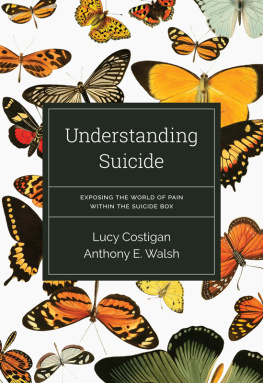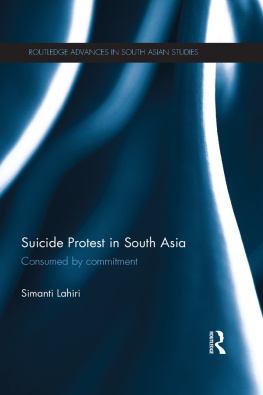about the authors
Suman Gupta is a professor of literature and cultural history at the Open University, UK, and honorary senior fellow at Roehampton University, UK.
Milena Katsarska lectures in American studies at the Paisii Hilendarski University of Plovdiv, Bulgaria.
Theodoros A. Spyros is a post-doctoral fellow of historical sociology at the University of Crete, and adjunct academic staff in the sociology and anthropology of sports at the Hellenic Open University.
Mike Hajimichael is an associate professor at the University of Nicosia, Cyprus, in the Department of Communications.
Usurping Suicide
The Political Resonances of Individual Deaths
SUMAN GUPTA, MILENA KATSARSKA THEODOROS A. SPYROS, AND MIKE HAJIMICHAEL
Usurping Suicide: The Political Resonances of Individual Deaths was first published in 2017 by Zed Books Ltd, The Foundry, Oval Way, London SE RR, UK.
www.zedbooks. net
Copyright Suman Gupta, Milena Katsarska, Theodoros A. Spyros and Mike Hajimichael 2017
The rights of Suman Gupta, Milena Katsarska, Theodoros A. Spyros and Mike Hajimichael to be identified as the authors of this work have been asserted by them in accordance with the Copyright, Designs and Patents Act 1988 .
Typeset in Bulmer by Swales and Willis Ltd, Exeter, Devon
Cover design by Andrew Brash
All rights reserved. No part of this publication may be reproduced, stored in a retrieval system or transmitted in any form or by any means, electronic, mechanical, photocopying or otherwise, without the prior permission of Zed Books Ltd.
A catalogue record for this book is available from the British Library.
ISBN -- 78699 -- hb
ISBN -- 78699 -- pb
ISBN -- 78699 -- pdf
ISBN -- 78699 -- epub
ISBN -- 78699 -- mobi
Contents
This book arises from the collaborative project Framing Financial Crisis and Protest: North-West and South-East Europe ( 2014 ). The authors are very grateful to the Leverhulme Trust for funding the project.
The research and analysis which inform this book were discussed in some detail during a project workshop in London, July 2016 . Comments by participants there have helped shape the final draft.
Thanks are due to John Seed, P. K. Vijayan and Fabio Akcelrud Duro for reading early drafts of some of the chapters and making perceptive comments.
The authors alone are responsible for shortcomings in the following pages.
One of the conundrums of liberal democratic politics is that individuals are constantly courted but cannot be seen or heard. The individual does not have a material presence. This is a pervasive conundrum, not confined to specific constitutional and institutional arrangements. Some degree of adherence to liberal democratic principles are claimed in an overwhelming majority of political states at present, and those principles provide an ostensible operating system for global economic, governmental and media operations. So, political discourses are constantly and ubiquitously centred on concepts of individual freedom, individual choice, individual rights, in-principle equality of individuals (e.g. in the eyes of the law), dignity of the individual, and so on. However, the individual can only be politically apprehended in the abstract. This could be as a statistical aggregate in relation to certain indicators (usually as components in majorities, minorities and proportions), or by way of a sampling of some collective attitude or experience. More often, the individual can be seen or heard as extraordinary in some way and therefore in the public eye and commanding the public ear, such as political representatives or celebrities. But the constantly highlighted extraordinary individual is not really the individual of liberal democratic discourse. Simply by being seen and heard this person becomes more than an individual, collectively significant in a way that the individual cannot be. The individual in liberal democratic discourse is relevant to all individuals, both ordinary and extraordinary. To distinguish those who are not seen and heard from those who are, and who are therefore more akin to the individual in general, we may designate them ordinary individuals .
The obvious fallout of this conundrum is that, while the individual (which means all individuals) seems to confer democratic legitimacy on the state, and the state claims to have responsibilities towards and courts the individual constantly, the individual cannot be meaningfully thought of as being politically determinative. The individual can only be acted upon collectively (for instance, by legislation and persuasion); the individual cannot be a political actor or exert political agency unless she surfaces as extraordinary and thereby surrenders her individuality.
The tensions that arise from this are most keenly felt when the politics of death-dealing is contemplated. Death, in an immediate sense, is the great equaliser of all individuals each will die. In various ways, the management of unnatural death seems like an ultimate test of liberal democratic principles. The liberal democratic claim of being confirmed by individuals and protecting individual interests seems to have a particular bearing on securing the lives of individuals every individual. Thus, when the state considers the acceptance and formal processing of some kind of unnatural death of individuals (usually through legal provision following the principle of the rule of law), the most passionate and inconclusive debates arise. Few political debates have been as heated as those concerning the legal status of euthanasia (assisted suicide), recourse to capital punishment, the legitimacy of killings by state agents (by soldiers of civilians in conflict situations, by police of suspects in custody or in encounters, etc.). Innumerable advocatory and analytical treatises of philosophy, jurisprudence, sociology, ethnography, politics and history seek to clarify the liberal position with regard to dealing with unnatural death.
Similarly discomfiting from the liberal democratic perspective is the contemplation of an ordinary individuals suicide. In an immediate manner this might be regarded as an instance of irreversible failure on the part of the state or as an irrevocable rejection of the states ability to offer security to an individual. However ordinarily unseen and unheard an individual might be, an individual act of suicide could become a most damaging gesture for the liberal democratic order, undermining some of its fundamental principles and claims, if it were to assume political dimensions and instantiate a political debate . Consequently, discussion of individual acts of suicide as being political is largely discouraged or tends to be muted not only in formal discourses (in legal processing or media reportage) but often also by a kind of self-censorship or moral anxiety within society. Thus, discussions of individual suicides by, for example, interested specialists and academics tend to prefer analytical framings that discount political implications or consider them only after carefully de-individuating such acts. An individual suicide that appears to have a political dimension, perhaps because the act was explicitly performed as a political gesture, is generally regarded by authorities as nevertheless resulting from narrow individual concerns a mental health issue or stressed personal circumstances (e.g. domestic discord). Considered thus, the act of suicide assumes a contained significance and is removed from political reckonings. Analyses of suicides with clearly articulated political interests usually focus on trends from a large number of suicide acts rather than on an individual act (de-individuation). Thus, a rise or fall in suicide rates could be variously analysed as reflecting political and social realities.












